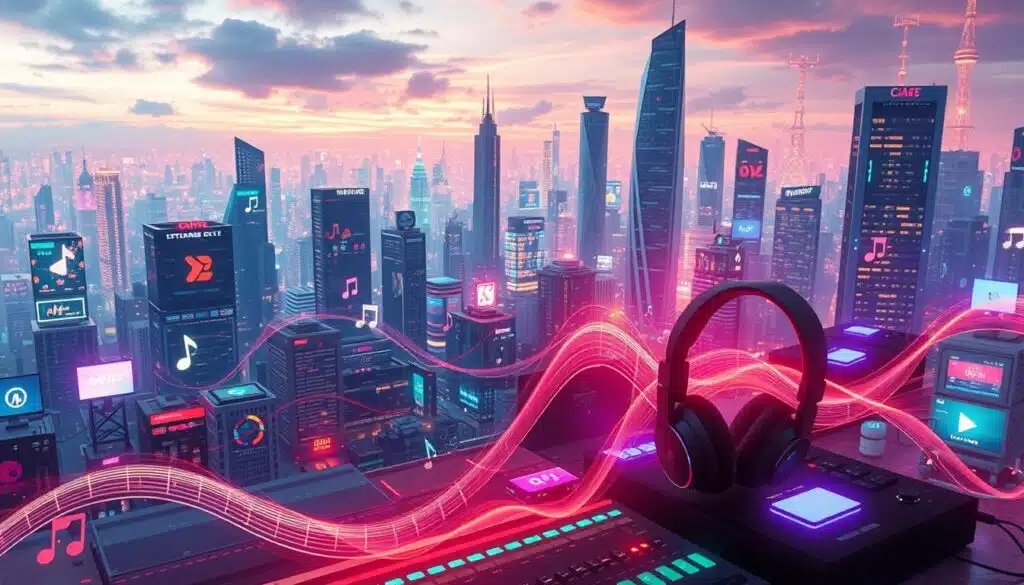Music Technology has always been a key part of our culture, changing and growing over time. Technology has greatly influenced the music industry, changing how we make, share, and listen to music. Now, digital recording tech lets artists make professional music at home, leading to more independent artists and diverse music styles.
Technology has changed how we share and enjoy music too, thanks to online streaming services. These services help artists reach fans all over the world. Live shows have also changed, with new tech like electronic instruments and lights making them more exciting.
Artists can now work together from anywhere, thanks to technology. This has opened up new ways for musicians and fans to be creative together.
Key Takeaways
- Advancements in digital recording technology have democratized the music production process, allowing artists to create high-quality recordings from home.
- The rise of online music streaming services has provided artists with unprecedented opportunities to reach a global audience.
- Live performances have been transformed with the integration of electronic instruments, lighting, visuals, and stage effects, creating more immersive experiences.
- Technology has made it easier for artists to collaborate remotely, breaking down geographical barriers.
- The impact of music technology is shaping the future of sound and opening up new creative possibilities for musicians and music enthusiasts.
The Profound Impact of Music Technology on Production
Technology has changed music production a lot. Now, artists can make high-quality music at home thanks to digital recording tech. Tools like music production software and music production hardware let artists make music without big studios.
Affordable Recording Software and Hardware
Now, musicians can get into music production without spending a lot. With tools like Pro Tools and Ableton, artists can make their own studios at home. This lets them try out new sounds and styles freely.
More artists are making music on their own, making music styles more diverse. They’re not stuck with old recording ways anymore.
Rise of Independent Musicians and Diverse Musical Styles
Thanks to easy access to music production tools, we see more kinds of music. Independent musicians and emerging artists can be creative without big labels. This has led to more unique and mixed-up music styles.
Now, we see more sound design and audio post-production innovation. This makes indie music better and more expressive.
“The democratization of music production has empowered a new generation of artists to create and share their music with the world.”
Music Technology and Innovative Distribution Channels
Digital music distribution has changed how artists connect with their fans. Now, with Spotify, Apple Music, YouTube, and SoundCloud, artists can reach fans all over the world. These music technology platforms have changed how we listen to music. They make it easy for fans to find and enjoy different types of music and artists.
Artists and labels are finding new ways to make money, like through music licensing and live shows. They’re also using social media to talk directly to their fans. This approach helps artists connect more with their fans and find new ways to make money from their music.
Online Streaming Services and Global Reach
Online streaming services have changed the music industry a lot. They let artists reach fans all over the world. Services like Spotify and Apple Music make it easy for fans to find new music and artists. This has changed how we listen to music and given artists new ways to make money through digital distribution and music streaming.
| Streaming Service | Monthly Active Users (in millions) | Paid Subscribers (in millions) |
|---|---|---|
| Spotify | 406 | 182 |
| Apple Music | 88 | 78 |
| YouTube | 2,291 | 50 |
| SoundCloud | 175 | 2.5 |
“The explosion of music streaming has transformed the way people consume and discover music, opening up new opportunities for artists to reach a global audience.”
Music Technology
Music has changed a lot thanks to new music technology. Now, we have electronic instruments and immersive live shows. Technology has made a big mark on the music world.
Electronic Instruments and Immersive Live Experiences
Electronic instruments like synthesizers and drum machines have given musicians new sounds. These tools have changed how music is made and performed live. Now, concerts are more than just music; they’re visually stunning and tech-filled.
With stage effects, lighting, and immersive audiovisual integration, shows are unforgettable. This makes concerts an experience you won’t forget.
Remote Collaboration and Breaking Geographical Barriers
Music tech has made it easier for musicians to work together from anywhere. This has removed old barriers that stopped artists from sharing their work worldwide. Now, artists can work together on interdisciplinary projects no matter where they are.
This has made the music industry more connected. Musicians can now share their music with fans all over the world. They’re finding new ways to make and perform music together.
| Music Technology Advancements | Impact on Live Performances |
|---|---|
| Electronic Instruments (Synthesizers, Drum Machines) | Expanded Sonic Possibilities, Visually Stunning Experiences |
| Stage Effects, Lighting, Audiovisual Integration | Immersive and Technologically-Enhanced Concerts |
| Remote Collaboration Tools (Livestreaming, Remote Recording) | Global Artistic Exchange, Interdisciplinary Projects, Reaching New Audiences |
“Music technology has revolutionized the way we create, perform, and experience music, breaking down barriers and fostering a more interconnected and collaborative industry.”
Revolutionizing Music Education with Technology
Technology has changed how we learn music, making it easier and more accessible. Sites like Yellowbrick are leading this change. They offer courses that help musicians grow and succeed in the music world.
These courses cover many areas, like music production, songwriting, and music business. Thanks to technology, students can learn these skills from home. This prepares them for careers in music.
- Accessible and Flexible Music Education: Online courses let students learn at their own speed. This fits busy lives and different learning styles.
- Comprehensive Curriculum: The courses include a wide range of music technology topics. This gives students the skills and knowledge they need for today’s music industry.
- Industry Insights and Networking Opportunities: Many programs offer advice from music pros and chances to meet others in the field.
Technology has opened doors for those wanting to make a career in music. These online programs give people the skills and knowledge they need. They’re helping create a new generation of musicians who are ready for the future.
The Disruptive Influence of Digital Technologies
The digital music revolution has changed the music industry a lot. It used to be all about major record labels and old ways of sharing music. But now, thanks to digital tech, the industry has changed a lot.
From Napster to Streaming: The Transformation of Music Consumption
Napster and music piracy through file-sharing hurt album sales and revenue for big record labels. But then, digital platforms like iTunes and Spotify changed everything. They changed how we listen to and make money from music.
Democratization of the Music Industry
Now, the digital age has made it easier for independent artists and small labels to get their music out there. Social media and video platforms let artists talk directly to fans, cutting out the need for big marketing budgets. This has made the music industry more open and diverse for everyone involved.
| Aspect | Traditional Music Industry | Digital Music Industry |
|---|---|---|
| Distribution | Controlled by major record labels | Democratized, accessible to independent artists and small labels |
| Artist-Fan Engagement | Limited, reliant on expensive marketing and promotion | Direct, enabled by social media and video streaming platforms |
| Music Consumption | Physical album sales | Streaming, digital downloads, and personalized playlists |
| Revenue Streams | Album sales, radio airplay, licensing | Streaming royalties, live performances, music licensing, and new business models |
The digital era has brought both good and bad changes to the music industry. It has made the industry more diverse and open for both creators and listeners.
Pivoting in the Digital Era: New Revenue Streams
The music industry has changed a lot in the digital era. Artists and businesses now look for new ways to make money. Live music has become more important, with more people attending shows over the years.
Growth of Live Music and Livestreaming
When COVID-19 hit, live shows stopped, and musicians started livestreaming on social media. They used donation links and paid services to earn money. This new way of performing has helped artists make money and connect with fans.
Music Licensing and Placement Opportunities
Artists and publishers are now into music licensing and music placement. They work with TV shows, films, commercials, and video games. This way, they earn from royalties and synchronization fees, fitting into the digital era.
The music industry has changed a lot, needing new ways to make money. Now, there are many diverse revenue streams and a more entrepreneurial mindset among musicians. They’re into livestreaming, music licensing, and even the video game and video streaming industries. This keeps the music industry alive in the digital era.
Also Read : How Are Smart Cities Shaping The Future Of Construction Technology?
Conclusion
The future of music and media in 2024 is set to be exciting and full of change. Technology and creativity will come together to shape our music world. We’ll see new trends like XR in live shows, blockchain for fair royalties, and AI in music making.
NFTs and AI will change how we share and make music. This will also open up new ways for artists to express themselves. With more people wanting audio content, we’ll see new formats and platforms, like podcasts, grow.
The future is all about combining innovation with the power of music. This will benefit artists, creators, and fans. Technologies like music tech, AI, and blockchain will shape the future of sound. They will help the music industry grow and change in big ways.
FAQs
Q: What is the Music Technology Program at the School of Music?
A: The Music Technology Program is designed to provide students with a comprehensive education in music production, audio engineering, and the use of technology in contemporary music. It combines hands-on learning experiences with theoretical knowledge to prepare students for careers in music and audio production.
Q: What elective courses are available in the Music Technology Program?
A: The program offers a variety of elective courses, including audio production, music theory, ear training, and multimedia production. These electives allow students to tailor their education to their interests and career goals.
Q: Can I specialize in electronic music within the Music Technology Program?
A: Yes, students can focus on electronic music by choosing electives related to electronic dance music, synthesizers, and digital audio production. This specialization provides students with the skills to compose and produce electronic music effectively.
Q: What kind of hands-on learning opportunities are provided?
A: The program emphasizes hands-on learning through access to state-of-the-art recording studios, real-time audio processing, and opportunities to work with modern music technology. Students gain practical experience that is essential for careers in audio engineering and music production.
Q: What degree can I earn through the Music Technology Program?
A: Students can earn a degree in music technology, which is designed to equip them with the skills and knowledge needed for various roles in the music industry, including audio engineer and music producer.
Q: Are there opportunities for music research in the program?
A: Yes, the Music Technology Program encourages students to engage in music research, exploring topics such as signal processing, soundscapes, and the impact of technology on musical expression. This research can enhance their understanding of both contemporary and popular music.
Q: Will I learn to use a digital audio workstation (DAW) in this program?
A: Absolutely! Students are trained to use various digital audio workstations, which are crucial tools for audio production and music creation. This skill is essential for anyone pursuing a career in music technology.
Q: How does the program prepare students to become sound engineers?
A: The program offers extensive training in audio recording, mixing, and post-production techniques. Students gain hands-on experience with equipment and software used in the industry, preparing them for a successful career as a sound engineer.
Q: Is there a focus on music performance in the Music Technology Program?
A: While the primary focus is on music technology and production, there are opportunities for music performance integrated into the curriculum. Students can participate in ensembles and performances that incorporate technology in live performance.








